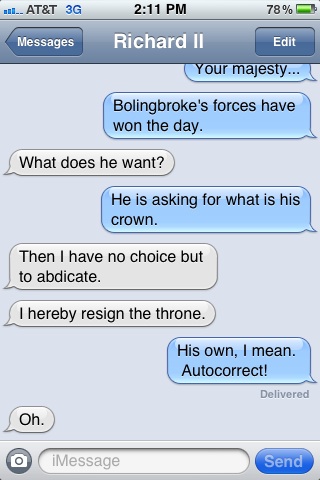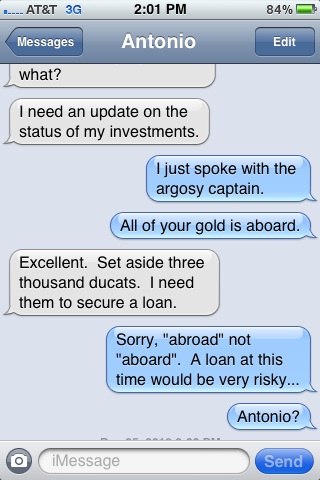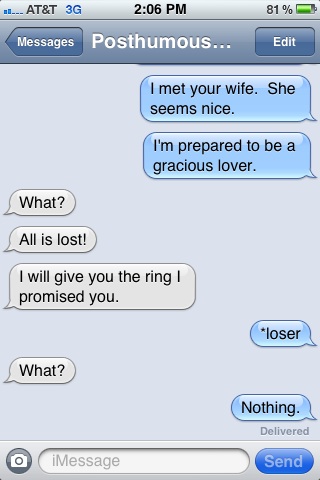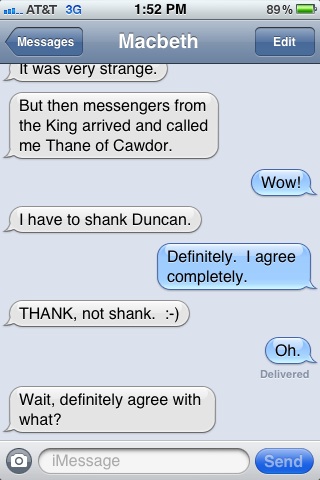Video: Richard II (The Hollow Crown)
Sunday, September 29th, 2013This.
Enthusiastic and meme-hip as it is, my one-word review of The Hollow Crown, Sam Mendes’s four-part television adaptation of Shakespeare’s second tetralogy, probably deserves further elaboration. I’ll be watching the productions on DVD, so I may be somewhat out of sync with your local PBS airing currently underway. But you can also catch the series on streaming video through the PBS website, so it’s all good. This review will focus mostly on Richard II, the first of the four plays, because I haven’t watched the other three yet.
Now, if you’re a faithful reader of this blog or, well, met me once, you know this is the kind of thing I live for, and you’ll be prepared for the breathless effluence of a hardcore fan. But truth be told, I can be a tough audience. Because I know the play so well, it’s hard to get me to suspend my disbelief. And this is a tough play. The language is lofty and poetic, even by Shakespeare’s standards, so it’s harder to get the words to sound natural.
And yet, I found myself riveted by the dramatic tension of the scenes, despite knowing not only what was about to happen, but also the exact words that were about to be spoken. I don’t know how that’s possible, but truly I was engrossed the whole time. The actors were top-notch across the board, and the direction was very clear in telling the story. The scenes were beautifully shot and in high definition. True, I was watching it on DVD, but I checked out the streaming feed for this review, and was very impressed at how high you could set the picture quality. Welcome to the future of Shakespeare.
The opening scene started with voice-over of Richard’s “let’s talk of graves” speech, the speech that “the hollow crown” comes from. I must confess feeling a moment’s hesitation, as I worried the director was going to get cute with the play. But then Richard calls for his uncle, John of Gaunt, and it’s Patrick Stewart. Lines are spoken, and I’m feeling the brain burst. This is going to be a wild 148 minutes.
We don’t get much Patrick Stewart, but we do get the “royal throne of kings” speech with full Tom Hooper Les Miz close-up. It’s fantastic, of course, but it’s the subsequent scene between Gaunt and Richard that I had to put back and watch again. And then (spoiler) Stewart’s gone, but we’re given no less than David Suchet (York) to take up the baton. And those are just the supporting players.
Worth mentioning is Rory Kinnear as Bolingbroke. His demeanor is somewhat understated, as is appropriate to the character, but he has some really nice subtleties to his performance. But the real standout in the cast was Ben Wishaw as Richard. I didn’t know much about him outside of Shakespeare Uncovered and James Bond, so I was completely unprepared for just how good he was going to be. Wishaw creates a soft, pampered Richard through his body posture, vocal intonations, and a not-insigificant contribution from a monkey. But then, as his place is challenged, his character arc transitions from entitlement-fueled rage to deep melancholy despair without losing any of the qualities Wishaw had established for Richard. He made me feel the “let’s talk of graves” speech, which I’ve taught phrase-by-phrase, as though I was hearing it for the first time. His performance in the (spoiler) abdication scene alone elevates him to a level of greatness where I can say that his participation in any future project will be no less of a draw for me than a Patrick Stewart or a David Suchet, and that’s no small compliment.
I do have some very minor quibbles that have much more to do with my own Shakespeare pedantry than anything lacking in this production. Some lines I like got cut, but I’ll get over it. Northumberland and especially Henry Percy are underdeveloped. This wouldn’t be a big deal if it were a stand-alone production of Richard II, but the characters reappear in later plays, and the fact that the Percys supported Richard’s ascension in this play adds an ironic layer that’s only possible when you do the plays together. But I understand Jeremy Irons will be playing Henry IV, so maybe the other actors will be replaced as well. Also, I missed the Duchess of Gloucester. Would it really been so hard to have called up Helen Mirren or Vanessa Redgrave or somebody and ask if she had a day to come in and do a scene with Patrick Stewart?
But these are my problems and not yours. If you like to order your Shakespeare well done, you won’t be disappointed. If you’re not a fan of Shakespeare, this might be your way in. And if you are a fan of Shakespeare, but not the histories (Duane), you owe yourself this unique opportunity to see what all the fuss is about.
I’ll post more reviews as I watch the rest of the series.
ETA: Duane’s already on it.





